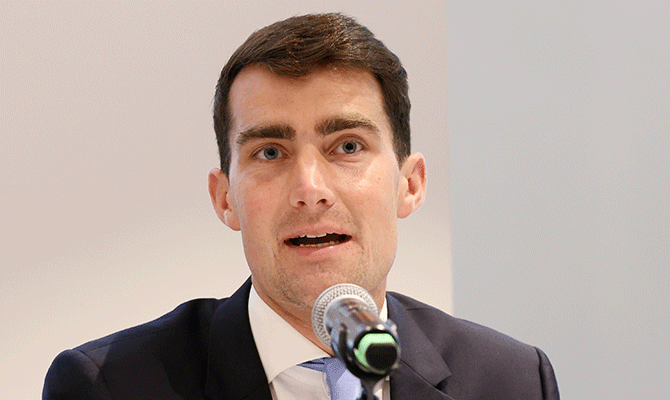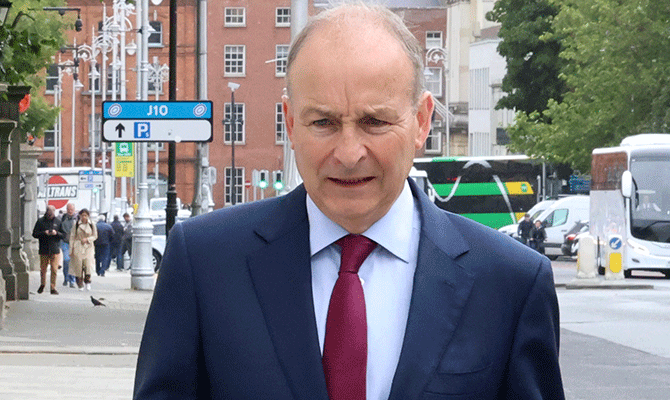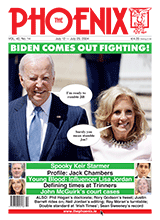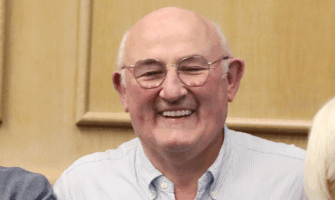
Jack Chambers
THE MEDIA consensus – or should that be group think – is that the newly elevated finance minister, 33-year-old Jack Chambers, is Ireland’s very own John F Kennedy and the Fianna Fáil leader-in-waiting. There are other ways to describe Chambers, one being that of the new FF model, imagined and formed in the mind of leader Micheál Martin, with the ‘right’ credentials, both figuratively and political. Along with the new politics comes the cool, clean and decidedly middle-class persona, and being a doctor and a lawyer helps Jack to present such an image. Can “that nice young man”, as the Sunday Independent recently described him, introduce an election-winning budget and go on to succeed his patron, Martin, as party leader and taoiseach?
From the start, Chambers’ political career was a perfect picture of what Martin has tried to create as the new FF party – namely modernist, middle class, liberal and antirepublican. His recent coming out as gay helped to buttress this image, although more than a few recalled with resentment his less-than-liberal opposition to the ‘right to choose’ campaign. Jack’s dad, pain management consultant Frank Chambers, was chair of the FF Dublin West constituency party and was aide to then finance minister Brian Lenihan, whom he attended to in his final weeks back in 2014. Initially the post-Lenihan scenario was that Brian’s sister, Anita, would stand in the consequent by-election in 2014 but her failure to stand in the local elections that year told against her and local councillor David McGuinness defeated her at the selection convention. In the aftermath of FF’s 2011 election disaster, McGuinness fared well in two subsequent by-elections, showing that he would win a seat at a general election in the four-seat constituency. So McGuinness seemed to be the candidate of choice in Dublin West as the party set about rebuilding itself.
However, he became a victim of the leadership’s quest for smoother, more middle-class candidates and Jack – with the backing of the Lenihan family, his own father and party HQ – ensured that he replaced McGuinness as the candidate. McGuinness protested that he was the victim of anti-working-class bias and claimed that he obviously came from the “wrong side of the tracks”. This recrimination is not simply the type of internal party bickering that accompanies defeat at conventions and the like. Martin’s Fianna Fáil rebuilding strategy demanded as its centre-piece that it recover its middle-class vote that Fine Gael ‘stole’ (Phil Hogan called it a loan) at the 2011 general election. This in turn required ‘respectable’ politics (not a trace of the Republican Party’s republicanism), clean-cut candidates and a move away from the social democrat strain of politics that had characterised FF since its foundation. Chambers ticked every box – or nearly every box.
The announcement in January that he is gay was a timely move, which came a few months before he was appointed as finance minister and deputy leader of the party. It is difficult to see this sequence of events as not being politically choreographed. But the liberal persona so carefully cultivated does not square with the fact that both Jack Chambers and his dad were considered to be part of the conservative wing of the medical profession in matters such as abortion and so on. And while senior Oireachtas politicians have congratulated him, the response from the LGBTQ community has been muted given his past, vocal opposition to a woman’s right to choose.
NEW FACE OF FF
In the years since his first election as a TD in 2016, Chambers became the new face of the party, along with other young TDs such as Lisa Chambers (no relation) and Charlie McConalogue, now agriculture minister. Lisa became the spokesperson on Brexit, a heavy responsibility that appeared not to have enabled her to retain her Mayo seat in 2020, while Jack became a junior minister (finance) in 2020 before being made Government chief whip some weeks later. In 2018 Jack Chambers spoke at the MacGill Summer School, where he defended the triple lock but also made it clear why he supported the EU’s military initiative, Pesco. In the same period, he and some of the other FF newbies showed their colours when opposing the more traditional FF ex-minister Willie O’Dea’s demand for an extra fiver for all social welfare recipients in the budget. This sort of argument was heard again the following year in the months ahead of the 2020 general election, with the newbies such as Chambers again to the fore in resisting such ‘populist’ demands.
Jack Chambers was marked out for preferment in 2020 when he was selected to join the party’s negotiating team for talks on climate change but he provided much entertainment and some embarrassment on RTÉ’s Claire Byrne Live debate on climate during the election. On that occasion, he lost the run of himself and his temper, provoking much hostile listenership reaction. He also displayed a similarly, em, youthful style after his appointment as Government chief whip. During the first meeting of the party whips, he managed to alienate practically everyone gathered at the Oireachtas meeting, which is normally regarded as the most cordial of any committee meeting of the house.
More anxiety arose when Jack’s junior ministerial work load came to include responsibility for the Gaeltacht and the Irish language, despite not speaking Irish and never having issued a word about such issues. While Conradh na Gaeilge, the state-supported Gaelic league, welcomed Chambers’ intention to take an intensive course in Irish, Misneach spokesperson Kerron Ó Luain denounced this as insulting to the Irish-language community. To be fair, this embarrassment was properly the responsibility of Martin for appointing someone eminently unsuitable for the post. However, Chambers appeared not to bear any grudge over this debacle, as his tribute to the party leader and then taoiseach made clear shortly afterwards in May 2022. At that time Jack told the Sunday Independent: “He has my full support and I think he’s been an excellent Taoiseach, and is an excellent leader… As Government chief whip, it’s a privilege to serve with him and to see his total commitment to delivery and his grit and determination. I think he’s doing an excellent job.” Jack Chambers appears not to have yet mastered the art of understatement.
Martin’s handlers also appear to lack basic cop on as their rationale for Chambers’ rise to the deputy leadership post implies. Apparently, this bauble – not in the gift of a few men in an obscure back room somewhere – was reward and recognition of Chambers’ performance as director of local elections. The message was also delivered that the deputy leadership choice was partly due to Jack’s status as a Dub given that FF is struggling a little in Dublin.
SERIOUS HURDLES
Struggling a little? The Blueshirts had a good election in Dublin, taking 43 seats out of the 183 in Dublin City Council, Dún Laoghaire-Rathdown, South Dublin County Council and Fingal County Council, or 23.5% of the total. This compares very well to FF’s 24 seats, or 13.1%, in the same Dublin councils. And a recent Red C poll shows that FF’s rating in Dublin has fallen from 18% to 15% in the last month. Much has been made of the serious hurdles Jack Chambers must now negotiate as finance minister, namely the summer economic statement, the budget and the finance bill, as former FF handler Gerard Howlin pointed out last week. As the experienced party apparatchik would doubtless be aware, however, most of the heavy lifting for this triple economic crown has already been carried out – or did Messrs Michael McGrath and Paschal Donohoe, along with other senior FFG players, forget their real electoral timetable?
The big question, of course, is whether Martin is lining up Jack to take over as party leader and taoiseach (assuming FF is power again after the general election). Here again, a willing media – which lionises Martin because he keeps a centre-right Government in power – takes the wishful predictions of party handlers as gospel when they are told that an FF-led government is waiting to take over the reins again; that Martin will then move to take over the presidency with little or no opposition; and that Jack will become taoiseach.

Micheál Martin
LEADERSHIP ASPIRANTS
Much of this is predicated on the notion that the parliamentary party is composed of some rather meek souls, who are scared of challenging Martin for fear of creating political or electoral instability that would threaten them all. This situation is underlined by the fact that the FF parliamentary party is small (just 36 TDs) and that around half of them are either ministers, junior ministers or chairs of Oireachtas committees. It is also true that Martin and his handlers are regarded as control freaks that stamp on any signs of disloyalty to the party leader. However, this does not mean that all leadership aspirants have fled the field and will not be looking for support after the next election – depending what happens there – or if and when Martin goes for the Áras. And there is no reason to believe that Jack Chambers will be ushered into power without any challenge from rival leadership contenders.
If it is taken as given that any new leader must be a Dublin TD, then housing minister Darragh O’Brien will surely regard himself as in with a chance. O’Brien has not distinguished himself in his brief but that is not the message inside FF, at the top or bottom of the party, which insists that he is building houses and that his efforts are slowly but surely producing results. There is also the more formidable figure of Jim O’Callaghan. He has been cast into outer darkness by the leadership and has been unable to mount any serious leadership challenge but he is still seen as the intellectual and political heavyweight alternative to Martin. He would certainly compare favourably with the callow Chambers.
Right now, the better-than-anticipated local election results cast Martin as the master of all he surveys but those results, at 23%, were just 1% better than the vote share that the party secured at the general election in 2020. Jack’s problem is that he has been nurtured, promoted and backed up by the party’s machine, which is controlled by the leadership. In the political battles ahead – electoral, budgetary, internal – his assets and his flaws will be stress tested. It may be that he can stand on his own two feet in these bear pits. We shall soon see.


















